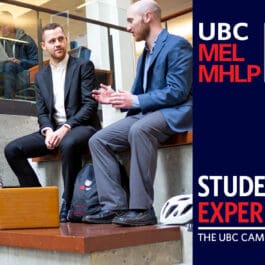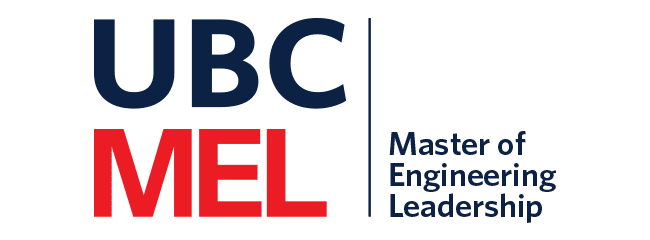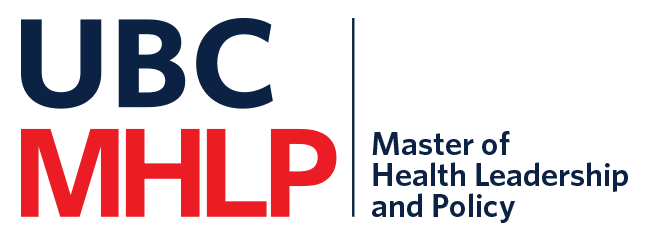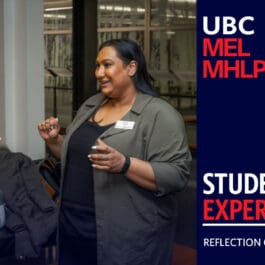
Unlocking Opportunities: Networking and Career Development

The Master of Engineering Leadership (MEL) and Master of Health Leadership and Policy (MHLP) are professional leadership degrees that offer students an interdisciplinary education in both a sector-specific technical area and business. There’s a crucial third pillar as well: professional development.
Professional development encompasses a range of activities – from skill-building workshops that focus on networking to attending conferences, field trips and industry workshops.
Leveraging networking beyond the classroom for career success
The MEL and MHLP leadership team adjust the programming offered throughout the year in recognition that there are different stages to the academic year and to students’ priorities from term to term.
“The first term is about self-discovery, whereas in term two the shift is to more actionable items so that students stand out when networking and are able to bridge the gap between where they are now and where they want to be after graduation,” says Jessi Guercio, the designated Career Strategist for the MEL and MHLP.
Each of the sector-specific specializations has academic enhancement funds available to support experiences outside the classroom, many of which offer important networking opportunities. Bailey Kew, Manager of Student Engagement, meets with program directors and the Advisory Board Committee to gather input on industry trends and the events students could benefit from attending.
In 2023, for example, Integrated Water Management students were funded to attend a BC Water & Waste Association conference, High Performance Building students attended a Canada Green Building Council conference in Vancouver, Clinical Education students attended the Quality Forum, organized by Health Quality BC and Seniors Care students attended the West Coast Conference on Aging, organized by Providence Health Care. (The opportunities available to students will change from year to year, depending on what is being offered and the costs involved.)
“Conferences are a great opportunity for students to get to know the people and organizations making a difference in their sector and better understand the challenges faced by their industry,” says Kew.
“Students meet people working in their field and start making those valuable connections. Attending conferences also builds the MEL and MHLP brands. Last fall, for example, a leader from a local company told me he first learned about the MEL after meeting a student at a conference, and his company has since hired six of our graduates.”
Charu Bhanot is an Integrated Water Management student who attended the three-day BC Water & Waste Association conference in Penticton, BC.
“We learned from industry experts about the challenges they are facing and the impacts of climate change,” she says. “As an international student, this was also a great opportunity for me to hear first hand about the water challenges in Canada and to meet with many other young professionals who shared their story with us.”
She says that the professional development workshops offered in the six months before the conference helped her practice her networking skills, including how to confidently introduce herself to strangers.
Professional Pathways: connecting and developing for success
Guercio, who develops and leads many of these professional development workshops, says they help students “learn how to present themselves, set goals about who they will connect with at events, feel comfortable sharing their story and accomplishments in these settings, and understand the importance of following up afterwards through LinkedIn to strengthen those connections.”
It clearly worked for Charu, who left the conference with dozens of new LinkedIn connections with industry professionals working at BC Hydro, Deloitte, the Ministry of Health and the American Water Association, among others.
“I definitely used the tips I learned in the first semester to network at the conference, and I believe that practising and polishing those skills at the conference will help me when I am looking for a job,” she says.
In April, Mary Gerali, a student in the MHLP in Clinical Education, attended the West Coast Conference on Aging in Vancouver.
“This was a truly amazing experience because I learned from and met people from so many different disciplines,” she says. “It was fantastic to connect with nurses, doctors, researchers and other health-care professionals who shared their observations and described their innovative practices.”
She says the give-and-take of networking meant she learned from others, while they learned from her. “I got to ask questions of many experts in the field, while also sharing my perspective and experience as a front line nurse.”
Credentials that matter: standing out through certifications
Term two is also a time where students are encouraged to explore certifications that might be relevant to their professional practice and career goals.
“We want to make sure our students finish the year with all the advantages available to them,” says Kew. “So sometimes that looks like helping them level up their skill set to meet demands. For example, we are funding Six Sigma certification for our MEL in Advanced Materials Manufacturing students if they wish to pursue this.”
In another example, MHLP students are offered a funding to cover some of the costs of Certified Health Executive (CHE) certification, a designation for health-care leaders issued by the Canadian College of Health Leaders. (Read more about this certification and the MHLP partnership with the college.)
Paving the way to the ideal job
As part of the Career Portfolio process, Guerico encourages students to complete monthly reflections – writing exercises to think back on the past four weeks, identify strengths and weaknesses, and set goals for the month ahead.
“Navigating a professional program like the MEL and MHLP is not that different from what it is to navigate conflicting priorities and projects when you are a leader in the organization,” he says. “So practising what it means to bring self-awareness to that is very important.”
He also notes that this process helps students prepare for writing cover letters and answering interview questions because they are better able to make the links between what they have learned and accomplished during the program with how they can contribute to an organization.
Bhanot believes that the program’s emphasis on professional development will pay off.
“The online information session I attended before applying for the program made it clear there were three main learning areas: technical, business and professional development. Getting that balance is important. Your studies alone will not help you get on your career path and be hired for the job you want.”
Gerali says that even being connected to the MHLP program through social media and LinkedIn has enabled her to learn of many different professional development and job opportunities that she would not otherwise know about, as well as make connections to MHLP alumni.
“All these opportunities together help me to see different leadership pathways,” she says.“I value having the opportunity to put my professional development to work so I can work for change and innovation in health care.”
Application Deadlines
The online application portal for the January 2025 has closed.
Get ready to apply!
Admissions for the 2026 intake will open on January 1, 2025.
How to ApplyJoin us for an
Info Session
Sign up for our latest online information sessions and discover what our programs have to offer.
Sign Up NowAssess your Eligibility
Determine if your professional experience and academic background make you a fit for your desired program.
Start Assessment


